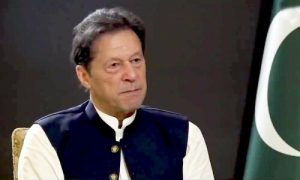Republican and Democratic senators have offered starkly contrasting interpretations of Donald Trump’s bombing of Iranian nuclear facilities after a delayed behind-closed-doors intelligence briefing that the White House had earlier postponed amid accusations of leaks.
Thursday’s session with senior national security officials came after the White House moved back its briefing, originally scheduled for Tuesday, fueling Democratic complaints that Trump was stonewalling Congress over military action the president authorized without congressional approval.
“Senators deserve full transparency, and the administration has a legal obligation to inform Congress precisely about what is happening,” the Senate Democratic leader, Chuck Schumer, said following the initial postponement, which he termed “outrageous”.
Even as senators were being briefed, Trump reignited the row with a Truth Social post accusing Democrats of leaking a draft Pentagon report that suggested last weekend’s strikes had only set back Iran’s nuclear program by months – contradicting the president’s insistence that it was “obliterated”.
“The Democrats are the ones who leaked the information on the PERFECT FLIGHT to the Nuclear Sites in Iran. They should be prosecuted!” he wrote.
The partisan divisions were on display after the briefing, which was staged in the absence of Tulsi Gabbard, the director of national intelligence, who previously told Congress that Iran was not building nuclear weapons, before changing her tune last week after Trump said she was “wrong”.
Instead, the briefing was led by CIA director John Ratcliffe, secretary of state Marco Rubio and defense secretary Pete Hegseth, who had publicly assailed journalists over their reporting on the strikes at a Pentagon press conference.
With intelligence agencies apparently in open dispute over the strikes’ effectiveness, Thursday’s briefing did little to clear up the clashing interpretations on Capitol Hill.
Lindsey Graham, a South Carolina senator and close Trump ally, said “obliteration” was a “good word” to describe the strikes’ impact.
“They blew these places up in a major-league way. They set them back years, not months,” he said. “Nobody is going to work in these three sites any time soon. Their operational capability was obliterated.”
But he warned that Iran would be likely to try to reconstitute them, adding: “Have we obliterated their desire to have a nuclear weapon? As long as they desire one, as long as they want to kill all the Jews, you still have a problem on your hands. I don’t want the American people to think this is over.”
But Chris Murphy, a Democrat from Connecticut, said Trump was “misleading the public” in claiming the program was obliterated and questioned why Gabbard had not attended the briefing.
His skepticism was echoed by Schumer, who said the briefing gave “no adequate answer” to questions about Trump’s claims.
“What was clear is that there was no coherent strategy, no endgame, no plan, no specific[s], no detailed plan on how Iran does not obtain a nuclear weapon,” he said, adding that Congress needed to assert its authority by enforcing the War Powers Act.
Gabbard and Ratcliffe had scrambled on Wednesday to back Trump, with Gabbard posting on X: “New intelligence confirms what POTUS has stated numerous times: Iran’s nuclear facilities have been destroyed.”
The ranking Democrat on the House intelligence committee, Jim Himes, dismissed the destruction claims as meaningless. “The only question that matters is whether the Iranian regime has the stuff necessary to build a bomb, and if so, how fast,” he posted.
The destruction response has also rankled Republican senators in the anti-interventionist wing of the party such as Rand Paul, who rejected claims of absolute presidential war powers.
“I think the speaker needs to review the constitution,” said Paul. “And I think there’s a lot of evidence that our founding fathers did not want presidents to unilaterally go to war.”
The Senate is expected to vote this week on a resolution requiring congressional approval for future military action against Iran, though the measure appears unlikely to pass given Republican control of the chamber.
The White House also admitted on Thursday to restricting intelligence sharing after news of the draft assessment leaking.
Press secretary Karoline Leavitt told reporters the administration wants to ensure “classified intelligence is not ending up in irresponsible hands”. Leavitt later said the US assessed that there “was no indication” enriched uranium was moved from the nuclear sites in Iran ahead of the strikes.
Trump formally notified Congress of the strikes in a brief letter sent on Monday, two days after the bombing, saying the action was taken “to advance vital United States national interests, and in collective self-defense of our ally, Israel, by eliminating Iran’s nuclear program”.
The administration says it remains “on a diplomatic path with Iran” through special envoy Steve Witkoff’s communications with Iranian officials.
At a dangerous moment for dissent in the United States
I hope you appreciated this article. Before you close this tab, I wanted to ask if you could support the Guardian at this crucial time for journalism.
When the military is deployed to quell overwhelmingly peaceful protest, when elected officials of the opposing party are arrested or handcuffed, when student activists are jailed and deported, and when a wide range of civic institutions – non-profits, law firms, universities, news outlets, the arts, the civil service, scientists – are targeted and penalised by the United States federal government, it’s hard to avoid the conclusion that our core freedoms are disappearing before our eyes – and democracy itself is slipping away.
In any country on the cusp of authoritarianism, the role of the press as an engine of scrutiny, truth and accountability becomes increasingly critical. At the Guardian, we see it as our job not only to report on the suppression of dissenting voices, but to make sure those voices are heard.
Not every news organisation sees its mission this way – indeed, some in the US have been pressured by their corporate and billionaire owners to avoid antagonising the government. I am thankful the Guardian is different.
Our only financial obligation is to fund independent journalism in perpetuity: we have no ultrarich owner, no shareholders, no corporate bosses with the power to overrule or influence our editorial decisions. Reader support is what guarantees our survival and safeguards our independence – and every penny we receive is reinvested in our work.
The Guardian’s global perspective helps contextualise and illuminate what we are experiencing in this country. That doesn’t mean we have a single viewpoint, but we do have a shared set of values. Humanity, curiosity and honesty guide us, and our work is rooted in solidarity with ordinary people and hope for our shared future.
It has never been more urgent, or more perilous, to pursue reporting that holds power to account and counters the spread of misinformation – and at the Guardian we make our journalism free and accessible to all. Can you spare just 37 seconds now to support our work and protect the free press? We value whatever you can spare, but a recurring contribution makes the most impact, enabling greater investment in our most crucial, fearless





